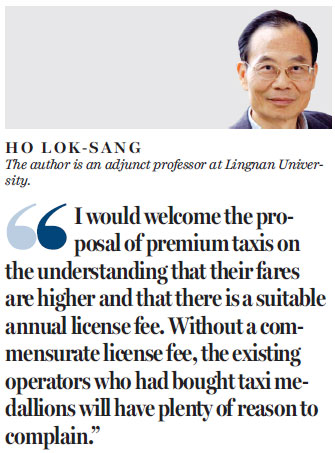The government should not issue premium taxi licenses for free
Updated: 2016-06-28 07:29
By Ho Lok-Sang(HK Edition)
|
|||||||||
I am all for extending the choices available to the public when they need taxi services. That is why I support the proposal to issue 600 new taxi licenses. I understand that these licenses will have an expiry date, but that does not mean that they should be issued gratis (for free)!
I heard the Secretary for Transport and Housing Anthony Cheung Bing-leung over the weekend defending the proposal on a radio program. He said these licenses will be issued gratis and have an expiry date. This, along with an employer-employee relationship between the licensee and the driver, allows the government to better regulate taxis. But this is not clear to me.
One problem with our existing taxis is that they are poorly regulated. The government should improve the regulations. Technological advances have now come to a stage that monitoring the quality of services is no longer difficult. This greatly enhances the quality of taxi regulation and only requires some ingenuity on the part of the regulators.

Why must premium taxi drivers be the employees of a taxi licensee? The government is assuming that the employer will do all the monitoring. But with some innovative thinking, the government can take and record complaints from passengers. A driver who repeatedly gets poor scores from passengers can have his taxi operating license revoked.
All that is needed is to set up a system so passengers can identify the driver and report their scores. Given that most people these days have smartphones, this easily allows passengers to identify, score, and transmit the evaluation to a central platform. Specific complaints can also be made if the passenger wants to.
One problem with the current taxi service is the government's adoption of a poor pricing structure which does not compensate drivers for the high cost of some services. It is therefore natural for them to pick some passengers and not others - even though they are not supposed to do this. But it is only fair if a journey which is twice as costly is charged twice as much!
Some years ago the government, after consultation with taxi operators and owners, implemented some changes to the fare structure - namely raising the charges for short trips and lowering them for long trips. This alleviated the problem, but only slightly.
I have long proposed that there should be a fare based on the duration a taxi is hired. This is to reflect the cost of engaging the driver and the vehicle. The fare should be based on distance to reflect the cost of fuel and maintenance.
There should also be a lump sum "pickup" cost to reflect the average cost of cruising around or waiting at the taxi stand in a queue between two paid trips. It turns out that Uber operates with a per-minute engaged charge alongside a mileage charge. The time charge will at least compensate the driver for his time and for renting the taxi.
Then there are fixed fares throughout the day - which do not make any economic sense. Fares should be higher at peak hours and lower at off peak hours. They should also be higher during hours when most people are sleeping.
In Singapore there is an early morning charge at 50 percent of the metered fare from midnight to 5:59 am. There is also a peak hour surcharge and a holiday evening surcharge.
The basic principle is that if fares reflect the cost of different trips appropriately there will be no reason for trying to pick passengers; this will take away one of the main reasons why taxi drivers are disgruntled.
Thus, even with the existing system of taxi medallions, there is considerable scope for better regulation and monitoring.
I would welcome the proposal of premium taxis on the understanding that their fares are higher and that there is a suitable annual license fee. Without a commensurate license fee, the existing operators who had bought taxi medallions will have plenty of reason to complain. Indeed, the public will be cynical if this is yet another case of the unfair transfer of benefits.
The government has indicated that it will issue three licenses, each of which would entitle the holder to operate up to 200 premium taxis. But why should a single licensee run so many taxis? This will exclude everyone except the rich and the powerful.
(HK Edition 06/28/2016 page10)